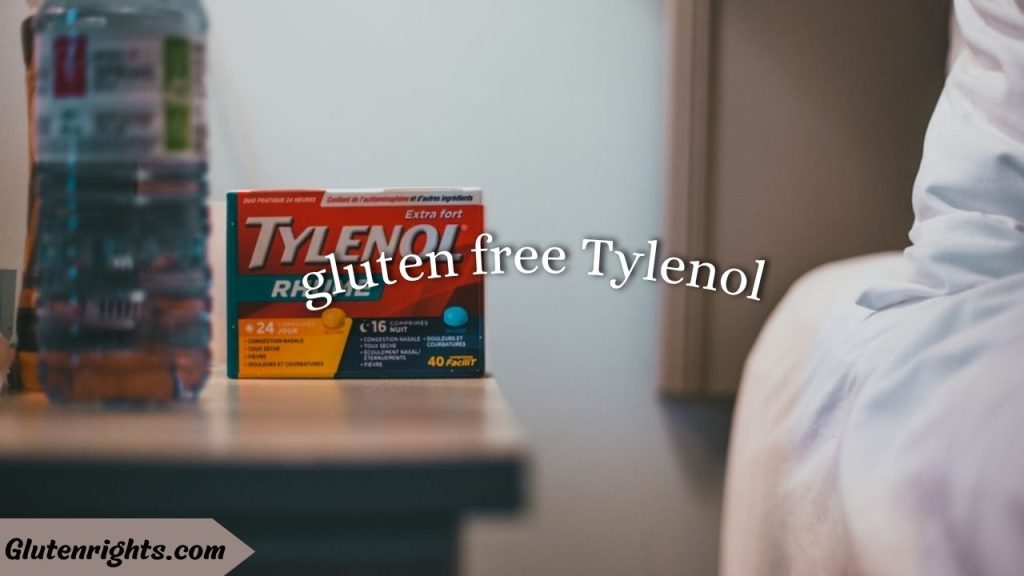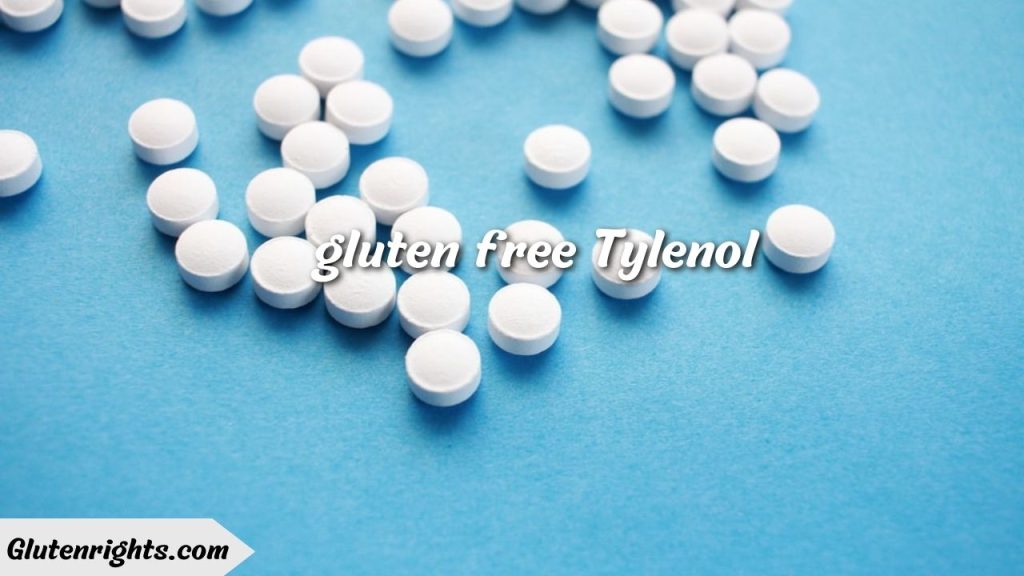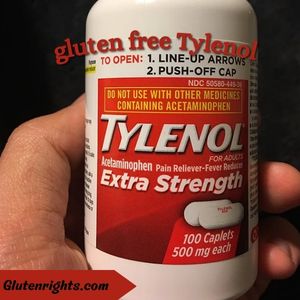Gluten free Tylenol is a variant of the popular pain reliever medication that is free from gluten, a protein commonly found in wheat, barley, and rye. This makes it a suitable option for individuals who have celiac disease, gluten sensitivity, or gluten intolerance. With gluten free Tylenol, such individuals can alleviate their pain without the risk of experiencing adverse gluten-related reactions.
What is gluten free Tylenol?
Gluten Free Tylenol is a variant of the popular pain reliever medication that is free from gluten. It’s a suitable option for individuals with celiac disease, gluten sensitivity, or gluten intolerance. The medication contains the same active ingredients as regular Tylenol, but without any added gluten. It’s a safe and effective option for individuals who need to avoid gluten in their medication.
Gluten Free Tylenol is made by Johnson & Johnson, one of the largest pharmaceutical companies in the world. The company uses a rigorous manufacturing process to ensure that the medication is free from gluten. Gluten is a protein that can cause adverse reactions in individuals with celiac disease or gluten sensitivity. By removing gluten from Tylenol, Johnson & Johnson is providing a safe and effective option for pain relief.
Gluten Free Tylenol comes in various strengths and formulations, including regular and extra-strength tablets, rapid release gels, and liquid suspension. The medication works by reducing fever and relieving pain, including headache, muscle aches, toothache, menstrual cramps, and arthritis. It’s a popular over-the-counter medication that is widely available in pharmacies and drugstores.

Why do people need gluten-free medication?
People need gluten-free medication because they have celiac disease, gluten sensitivity, or gluten intolerance. Gluten can cause inflammation in the small intestine, leading to a range of symptoms, including abdominal pain, bloating, diarrhea, constipation, and fatigue.
In addition to food, medications can also contain gluten as a binding agent or filler. This can pose a risk to individuals with celiac disease or gluten sensitivity who may experience adverse reactions to even small amounts of gluten. By using gluten-free medication, individuals with these conditions can avoid the risk of gluten-related reactions.
It’s important to note that not all medications are gluten-free, and individuals with celiac disease or gluten sensitivity should always read the label and consult with their healthcare provider before taking any medication.
Can celiac patients take Tylenol?
Yes, celiac patients can take Tylenol. However, it’s important to ensure that the Tylenol is gluten-free. Celiac disease is a serious autoimmune disorder that is triggered by the ingestion of gluten, Even small amounts of gluten can cause inflammation in the small intestine, leading to a range of symptoms, including abdominal pain, bloating, diarrhea, constipation, and fatigue.
Fortunately, Tylenol offers a gluten-free variant of their medication, which is safe and effective for individuals with celiac disease. The gluten-free Tylenol contains the same active ingredients as regular Tylenol, but without any added gluten. This makes it a suitable option for individuals who need to avoid gluten in their medication.
However, it’s important to note that Tylenol should still be taken under the guidance of a healthcare provider, as certain individuals may be more sensitive to the medication or may require different dosages based on their individual health needs. Additionally, individuals with celiac disease may be more susceptible to other health conditions, such as liver disease, that may require additional precautions when taking medications like Tylenol.
Gluten free Tylenol: is it effective for pain relief?
Yes, Gluten Free Tylenol is effective for pain relief. The medication contains the same active ingredients as regular Tylenol, including acetaminophen, which works by reducing fever and relieving pain. Gluten Free Tylenol is a suitable option for individuals with celiac disease, gluten sensitivity, or gluten intolerance who need to avoid gluten in their medication.
In clinical studies, Tylenol has been shown to be effective for a range of pain relief, including headache, muscle aches, toothache, menstrual cramps, and arthritis. The medication is available in various strengths and formulations, including regular and extra-strength tablets, rapid release gels, and liquid suspension, which provide options for individuals with different pain relief needs.
Gluten Free Tylenol is made by Johnson & Johnson, a reputable pharmaceutical company with a strong track record in producing safe and effective medications. The company uses a rigorous manufacturing process to ensure that the medication is free from gluten and safe for individuals with celiac disease, gluten sensitivity, or gluten intolerance.
While Gluten Free Tylenol is an effective option for pain relief. In some cases, Tylenol may not be suitable for individuals with certain medical conditions or who are taking other medications. Additionally, it’s important to always follow the recommended dosage instructions and avoid taking more than the recommended amount, as this can lead to serious health complications.
Ingredients used in gluten free Tylenol.
The active ingredient in Tylenol is acetaminophen, which is a pain reliever and fever reducer. Acetaminophen works by blocking the production of certain chemicals in the body that cause pain and inflammation. In addition to acetaminophen, Gluten Free Tylenol may also contain other inactive ingredients, such as cellulose, croscarmellose sodium, povidone, pregelatinized starch, stearic acid, and sodium starch glycolate.
These inactive ingredients are carefully selected to ensure that the medication is safe for individuals with gluten intolerance. For example, cellulose is a plant-based ingredient that is often used as a filler in medications, while croscarmellose sodium is a disintegrant that helps the medication dissolve quickly in the stomach.
Povidone is a binder that helps the medication maintain its shape, while pregelatinized starch is a thickener that helps the medication maintain its consistency. Stearic acid is a lubricant that helps the medication flow more smoothly during the manufacturing process, and sodium starch glycolate is another disintegrant that helps the medication dissolve quickly in the stomach.
Overall, the ingredients used in Gluten Free Tylenol are carefully selected to ensure that the medication is effective and safe for individuals with gluten intolerance. It’s important to always read the label and consult with a healthcare provider before taking any medication to avoid any potential side effects or health complications.
How is gluten free Tylenol processed?
The process of manufacturing Gluten Free Tylenol involves careful attention to detail to ensure that the medication is free from gluten and safe for individuals with gluten intolerance.
The first step in the manufacturing process is to source the raw materials used to create the medication. The active ingredient in Tylenol, acetaminophen, is often sourced from reputable suppliers that have strict quality control standards to ensure that the ingredient is pure and free from contaminants.
Once the raw materials have been sourced, they are tested for purity and quality before being combined with the inactive ingredients. The inactive ingredients used in Gluten Free Tylenol are carefully selected to ensure that they are free from gluten and safe for individuals with gluten intolerance.
The ingredients are then mixed together in a controlled environment to ensure that they are evenly distributed throughout the medication. The medication is then formed into tablets or capsules and tested for quality and purity before being packaged and distributed to consumers.
Overall, the manufacturing process for Gluten Free Tylenol is carefully controlled to ensure that the medication is safe and effective for individuals with gluten intolerance.
Is Tylenol PM gluten free?
Yes, Tylenol PM is available in a gluten-free formulation. The active ingredient in Tylenol PM, acetaminophen, is the same as in regular Tylenol and is gluten-free. Additionally, the inactive ingredients used in Tylenol PM are also carefully selected to ensure that the medication is safe for individuals with gluten intolerance.
Some of the inactive ingredients in Tylenol PM may include calcium carbonate, croscarmellose sodium, FD&C Blue #1 aluminum lake, hypromellose, magnesium stearate, microcrystalline cellulose, polyethylene glycol, polysorbate 80, pregelatinized starch, sodium starch glycolate, and titanium dioxide. These ingredients are carefully selected to ensure that they are free from gluten and safe for individuals with gluten intolerance.
It’s important to note that the ingredients used in medications can vary depending on the country or region where the medication is sold. As a result, it’s important to always read the label before taking any medication to ensure that it is safe and effective for your specific needs.
If you have gluten intolerance or celiac disease, it’s important to be aware of the potential sources of gluten in your diet, including medications. Choosing gluten-free medications, such as Gluten Free Tylenol or Tylenol PM, can help you manage your symptoms without risking any potential health complications.
Can gluten free Tylenol cause any side effects?
Like any medication, gluten free Tylenol can cause side effects in some people, although these are generally rare and mild. The most common side effect of taking Tylenol is an upset stomach, which may include nausea, vomiting, or stomach pain. In rare cases, taking too much Tylenol can cause liver damage, although this is more likely to occur in individuals who regularly consume alcohol or who have pre-existing liver damage.
It’s important to always follow the recommended dosage instructions on the label of any medication, including gluten free Tylenol, and to avoid taking more than the recommended amount. If you experience any side effects after taking gluten free Tylenol, such as hives, difficulty breathing, or swelling of the face or throat, it’s important to seek medical attention immediately, as these may be signs of an allergic reaction.
Additionally, if you have any pre-existing medical conditions or are taking any other medications, it’s important to consult with a healthcare provider before taking gluten free Tylenol to ensure that it is safe and effective for your specific needs. In some cases, certain medical conditions or medications may interact with Tylenol, which can increase the risk of side effects or other health complications.
Overall, gluten free Tylenol is generally considered safe and effective for most people when taken as directed. However, it’s important to be aware of the potential side effects and to seek medical attention if you experience any adverse reactions after taking the medication.
Also Check: gluten free lunchables

How gluten free Tylenol differs from other pain relievers.
Gluten free Tylenol differs from other pain relievers in several ways. First and foremost, Tylenol contains acetaminophen as its active ingredient, whereas many other pain relievers, such as ibuprofen or aspirin, contain different active ingredients. Acetaminophen is a pain reliever and fever reducer that works by blocking certain chemicals in the brain and reducing inflammation.
Secondly, Tylenol is considered to be a safer pain reliever for individuals with certain medical conditions, such as stomach ulcers or bleeding disorders, as it is less likely to cause stomach irritation or bleeding compared to other pain relievers. Additionally, Tylenol is generally considered safe for individuals with kidney problems, as it is not processed by the kidneys like other pain relievers and does not pose the same risks of kidney damage or failure.
Finally, gluten free Tylenol is an important option for individuals with gluten intolerance or celiac disease, as many other pain relievers may contain gluten as an inactive ingredient. Choosing a gluten-free pain reliever like Tylenol can help individuals with gluten intolerance manage their symptoms without risking any potential health complications.
Gluten free Tylenol for children: is it safe?
Tylenol is one of the most commonly used pain relievers for children and is often recommended by healthcare providers for managing pain and fever in infants and children.
It’s important to choose the appropriate dosage and form of Tylenol based on the child’s age and weight. Tylenol is available in different strengths and forms, including liquid, chewable tablets, and dissolvable tablets, which can make it easier to administer to children who may have difficulty swallowing pills.
While Tylenol is generally considered safe for children, it’s important to always follow the recommended dosage instructions on the label and to avoid giving more than the recommended amount. Overdosing on Tylenol can cause serious health complications, including liver damage or failure.
Additionally, it’s important to consult with a healthcare provider before giving Tylenol to a child with certain medical conditions, such as liver or kidney problems, or who may be taking other medications. In some cases, certain medical conditions or medications may interact with Tylenol, which can increase the risk of side effects or other health complications.
Overall, gluten free Tylenol is a safe and effective pain reliever option for children when used as directed and under the guidance of a healthcare provider.
Gluten free Tylenol vs. other pain relievers for people with gluten intolerance.
Gluten intolerance or celiac disease can make it difficult for individuals to find pain relievers that do not contain gluten. Many common pain relievers contain inactive ingredients, such as fillers or binders, that may contain gluten. For individuals with gluten intolerance or celiac disease, choosing a pain reliever that is certified gluten-free can help manage symptoms without causing potential health complications.
When compared to other pain relievers, gluten free Tylenol is a safe and effective option for individuals with gluten intolerance. Tylenol is a common over-the-counter pain reliever that is available in various forms, including tablets and liquid. Tylenol’s active ingredient, acetaminophen, is considered safe for individuals with gluten intolerance.
Other pain relievers, such as ibuprofen or aspirin, may contain gluten as an inactive ingredient. While these pain relievers may be effective for managing pain, they may not be safe for individuals with gluten intolerance
In addition to being gluten free, Tylenol is also considered to be a safer option for individuals with certain medical conditions, such as stomach ulcers or bleeding disorders, as it is less likely to cause stomach irritation or bleeding compared to other pain relievers.
Gluten free Tylenol and cross-contamination risks.
While gluten free Tylenol is manufactured without gluten-containing ingredients and is tested to ensure it meets gluten-free standards, there is still a risk of cross-contamination during the manufacturing process.
Cross-contamination occurs when gluten particles from other products or ingredients come into contact with the gluten-free product. This can happen at any point during the manufacturing process, from the sourcing of raw materials to the packaging of the final product.
To reduce the risk of cross-contamination, manufacturers of gluten free Tylenol take special precautions, such as cleaning equipment and production areas thoroughly between batches and using separate manufacturing lines for gluten-free products.
However, it’s important to note that even with these precautions, there is still a risk of cross-contamination. For individuals with severe gluten intolerance or celiac disease, even trace amounts of gluten can cause symptoms and potential health complications.
To reduce the risk of exposure to gluten, individuals with gluten intolerance should always read labels carefully and choose products that are certified gluten-free. It’s also important to talk to a healthcare provider about any potential risks or concerns related to using gluten free Tylenol or any other medication.
FAQs
Is Tylenol gluten free?
Yes, Tylenol is gluten free. However, some Tylenol products may be processed on equipment that also processes gluten-containing products, which could potentially lead to cross-contamination.
Can I take Tylenol if I have celiac disease?
Yes, most people with celiac disease can safely take Tylenol. Tylenol does not contain gluten in its ingredients, and studies have shown that it does not trigger celiac disease symptoms.
Is Tylenol PM gluten-free?
Yes, Tylenol PM is gluten-free. However, like other Tylenol products, it may be processed on equipment that also processes gluten-containing products, which could potentially lead to cross-contamination.
How can I find gluten free Tylenol at the drugstore?
You can look for gluten-free labeling on the packaging or check the ingredient list for any gluten-containing ingredients. If you’re unsure, you can ask the pharmacist for assistance.
Are there any side effects associated with gluten free Tylenol?
There are no known side effects associated with gluten free Tylenol. However, as with any medication, it’s important to read and follow the label directions and talk to your healthcare provider if you have any concerns.
How is gluten free Tylenol different from regular Tylenol?
Gluten free Tylenol is formulated without any gluten-containing ingredients and is processed separately from other products to avoid cross-contamination. Regular Tylenol may contain gluten, depending on the formulation, and is processed on equipment that also processes gluten-containing products.
